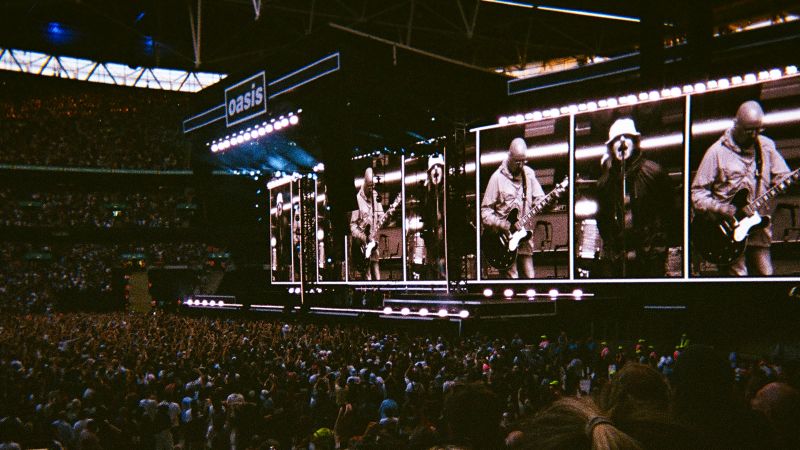Liam Gallagher, the iconic lead singer of Oasis, expressed his gratitude to an adoring crowd of 90,000 fans at Wembley Stadium, marking a significant moment in the band’s historic reunion concert. “It’s been a long time,” Gallagher remarked, playfully referencing the challenges of being in a band while acknowledging the audience’s commitment. This concert, part of their highly anticipated world tour, is not merely a return to the stage but a celebration of reconciliation and nostalgia among fans who have longed for the band’s comeback since their disbandment in 2009.
The reunion tour has commenced with a formula that has proven effective; the Gallagher brothers, Liam and Noel, have opted for minimal interviews, allowing the music to speak for itself as they navigate through a sold-out series of shows across five continents. Their approach is reminiscent of the allure that Oasis created in their prime during the 1990s, where iconic tracks from albums like “(What’s the Story?) Morning Glory?” continue to evoke a profound connection with listeners.
As they took the stage in Wembley, the collective excitement amongst the audience was palpable. The brothers, often embroiled in public spats, presented a united front, sharing the moment together with arms raised aloft. Their harmonious greeting reflected a long-overdue reconciliation that fans have yearned for, positioning the concert as a once-in-a-lifetime event that epitomized a musical resurrection. After 16 years away, Oasis was back, much to the delight of enthusiasts who treated it like a “second coming.”
For many fans, particularly those who grew up in the 1990s, Oasis’s music serves as a soundtrack to their formative experiences. The memories attached to “Morning Glory” are vivid, as it contained anthems that encapsulated the cultural zeitgeist of that decade. Songs like “Wonderwall,” “Champagne Supernova,” and “Some Might Say” ignited feelings of nostalgia, resonating across generations. The album itself, released in 1995, achieved near-immediate commercial success and critical acclaim, solidifying its status as one of the greatest rock records of all time, with over 22 million sales globally.
Walking down memory lane, the concert setlist comprised many beloved hits, including the uplifting “Hello,” which resonates with the sentiment of returning home. The band’s energy was infectious, playing at a spirited tempo and engaging with old and new fans alike. Tracks like “Acquiesce” highlighted the acknowledgment of their shared history, reflecting themes of unity and reliance on each other—a rare gem where both brothers share vocal duties.
What followed was a sensational roll through the band’s catalogue, echoing through the stadium as fans reveled in the nostalgia that Oasis’s music brings. Anthemic tracks received raucous receptions, and ballads that are often reflective felt refreshing in this charged atmosphere. The crowd’s energy crescendoed during classics such as “Wonderwall,” a song that hardly required any vocal efforts from Liam, as the audience sang along passionately.
The occasion marked a significant cultural moment too, symbolizing a revival of optimism reminiscent of the 1990s when British culture thrived. The initial optimism of the Labour government’s rise to power and the rise of artists like Oasis during that era contrasted sharply with the turbulent events that followed, leading to the band’s split in 2009 and a period of uncertainty in the UK.
Now, as the Gallaghers reunite, it strikes many as a moment of not just musical nostalgia but of a yearning for simpler times. Following years of economic decline, political turmoil, Brexit challenges, and the pandemic’s grip, Oasis’s return feels like a balm for the collective nostalgia that many seek, harkening back to an era perceived as untainted.
This summer’s tour serves as more than just concerts; it is a cultural phenomenon. Fans are conscious that with each performance, they are bridging past with the present. The juxtaposition of Oasis’s music resonates in modernity, as audiences seek temporary respite from harsher realities, igniting a journey back to an era that many remember fondly.
Oasis is set to continues their momentum with additional shows in London before taking their music to Scotland, Ireland, Canada, and beyond—an international tour that will extend through Brazil by November, proving that the spirit of their music remains alive, vibrant, and eternally relevant. The scene is once again reminiscent of the 1990s, and for many, the memories are joyously worth revisiting.











